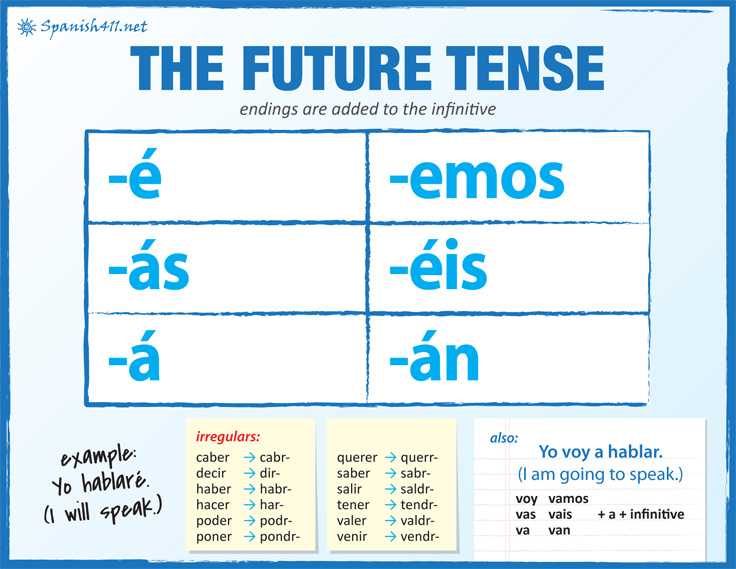How to Form the Simple Future Tense in Spanish
Hey Steemians!
This is a really easy lesson, and I'm not sure why, but in high schools, we always wait until junior year (3rd year) in Spanish to teach the future tense. It's actually easier than the past tense(s).
For the future tense, you add certain endings to infinitive verbs (root verbs like to eat, to sleep, etc.). These endings are always the same no matter if the verb is an -AR, -ER, or -IR verb. That's good news for you, because that means there are no tricks, no secrets with regular verbs. There are some exceptions when it comes to irregular verbs but the endings always remain the same nontheless. What comes before might change slightly with an irregular verb.
The endings for the future tense are as follows: -é, ás, á, émos, éis, án.
So, let's take an infinitive verb: comer means to eat.
The yo form of comer in the future would be yo comeré = I will eat.
The tú form of comer in the simple future would be tú comerás = You will eat. (not a command but rather a statement)
The él/ella/usted form is él/ella/usted comerá = He/She/You (formal) will eat.
The nosotros(as) form is nosotros(as) comeremos = we will eat.
The vosotros(as) form is vosotros comeréis = You all (Spain) will eat.
The ellos(as)/ustedes form is ellos(as)/ustedes comerán = They/You all will eat.
Let's take another verb: bailar means to dance.
Yo bailaré - I will dance.
Tú bailarás - You will dance.
Él/Ella/Usted bailará - He/She/You (forma) will dance.
Nosotros(as) bailaremos - We will dance.
Vosotros(as) bailaréis - You all (Spain) will dance.
Ellos(as)/Ustedes bailarán - They/You all (everywhere else + Spain (formal)) will dance.
One more verb: insistir means to insist
Yo insistiré = I will insist.
Tú insistirás = You will insist.
Él/Ella/Usted insistirá = He/She/You (formal) will insist.
Nosotros(as) insistiremos = We will insist.
Vosotros(as) insistiréis = You all (Spain) will insist.
Ellos(as)/Ustedes insistirán = They/You all will insist.
Now let's see some examples used in sentences
Yo iré a la playa el próximo mes. = I will go to the beach next month.
Tú comerás en la escuela mañana. = You will eat at school tomorrow.
Ella se presentará en la corte frente al juez. = She will present herself in court in front of the judge. (Reflexive so we need to add se before presentará.)
Nosotros jugaremos al tenis el jueves. = We will play tennis on Thursday.
Vosotros os acostaréis a dormir a las 9:00 de la noche. = You all (Spain) will go to sleep at 9:00 at night. (This one's reflexive so you need to add os in front of acostaréis.
Ellos se verán en pocos días = They will see each other in a few days. (Also reflexive, two people involved who will be seeing each other)

.jpg)


great information here!
Thank you!